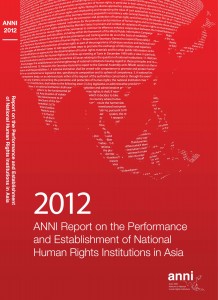Posts Tagged ‘Myanmar National Human Rights Commission’ (136 found)
Australian Human Rights Commission Hosts Myanmar Visitors
As part of the Strengthening Human Rights in Myanmar 2012 – 2016 project, conducted by Sweden’s Raoul Wallenberg Institute, the Commission has hosted a delegation from the Myanmar National Human Rights Commission.
Commission President, Professor Gillian Triggs, said it was an honour to be able to contribute to the project’s objective of helping the Myanmar Commission to more effectively implement their mandates to protect and promote human rights in their country […]
• • •Religious Violence in Myanmar, the Consequences of Government Inaction in Tackling Prejudice and Discrimination – UN Expert
The United Nations Special Rapporteur on the human rights situation in Myanmar, Tomás Ojea Quintana, today expressed serious concerns over the spread of violence between Muslim and Buddhist communities in Myanmar and urged bold steps by the Government to counteract this frightening trend […]
• • •Statement No. (2/2013) of the Myanmar National Human Rights Commission Regarding the Conflict in Kachin State
The Myanmar National Human rights Commission is gratified that the Union Peace-Making Committee and the KIO delegation were able to issue a joint statement at the peace talks held at Shweli (Ruili) of the People’s Republic of China on 11-12 March 2013 and that positive developments were achieved. The Myanmar National Human Rights Commission also whole-heartedly welcomes the statement that the Union Government will accelerate development and rehabilitation tasks in the Kachin State as the process to achieve cease-fire has commenced under said joint statement […]
• • •Roundtable Considers Founding Legislation for Myanmar NHRI
The APF was invited to Yangon in January to take part in a roundtable discussion on draft legislation to formally establish the Myanmar National Human Rights Commission.
The two-day meeting was attended by Commission members, along with representatives of government departments, the Office of the President, the Office of the United Nations High Commissioner for Human Rights and the APF’s Legal Counsel, Greg Heesom […]
• • •Statement No. 1/2013 on Humanitarian Assistance for the Conflict Victims of the Kachin State
A four-member team of the Myanmar National Human Rights Commission (MNHRC) visited Kachin State from 8 to 10 December, 2011 for the first time in order to observe at first hand the civil population who displaced as a result of armed skirmishes […]
• • •Human Rights Subject to be Added in Basic Education Curriculums
Human rights subject will be added into the basic education system of Myanmar, the Myanmar National Human Rights Commission told the Eleven Media. The curriculums of the elementary, middle and high level of the basic schools will be advanced […]
• •Myanmar Waits Approval of Draft Rights Law
A draft Myanmar National Human Rights law aimed at broadening the work of the human right commission and ensuring its independence has been sent to President U Thein Sein, the commission’s chairman said last week […]
• •Statement (8/2012) of the Myanmar National Human Rights Commission on the International Human Rights Day
One of the most important declarations of humanity, the Universal Declaration of Human Rights, was adopted on 10 December, 1948 and the day has been designated as the International Human Rights Day.
The Myanmar National Human Rights Commission joins today the international human rights community in celebrating this auspicious day […]
• • •APF Membership Expands to 19
The Myanmar National Human Rights Commission was admitted as the APF’s 19th member institution at this year’s APF Annual Meeting, held in Amman, Jordan, on 5 November 2012.
The APF Forum Council unanimously approved the Commission’s application for associate membership […]
• • •2012 ANNI Report on the Performance and Establishment of National Human Rights Institutions in Asia
 The past couple of years have seen an increasing international recognition of the role of NHRIs in the promotion and protection of human rights. A growing number of Asian countries have either recently established or are considering the establishment of NHRIs, including in Burma, where the Myanmar National Human Rights Commission (MNHRC) was set up in September 2011. Meanwhile the UN Human Rights Council on 16 June 2011 adopted a resolution on “National Institutions for the Promotion and Protection of Human Rights” – the first-ever Human Rights Council resolution to focus specifically on the work of NHRIs.
The past couple of years have seen an increasing international recognition of the role of NHRIs in the promotion and protection of human rights. A growing number of Asian countries have either recently established or are considering the establishment of NHRIs, including in Burma, where the Myanmar National Human Rights Commission (MNHRC) was set up in September 2011. Meanwhile the UN Human Rights Council on 16 June 2011 adopted a resolution on “National Institutions for the Promotion and Protection of Human Rights” – the first-ever Human Rights Council resolution to focus specifically on the work of NHRIs.
The resolution acknowledges the significant role of NHRIs in the promotion and protection of human rights at national level, as well as their important role in the Human Rights Council, and calls for further cooperation with regional coordinating bodies of NHRIs. These developments are set against the backdrop of a general deterioration in the situation of human rights in many countries in Asia. This can be seen, for example, in the adoption of various repressive laws such as national security laws […]
• • •








 All posts
All posts